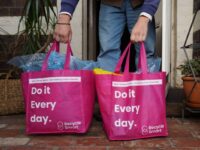This week ISB chats to Pirra Griffiths, Designer and Founder of independent Aussie label, Allerton Swimwear. Pirra has carved a niche in a field full of huge brands by doing things differently: Pirra creates luxury swimwear lines from recycled waste materials made only by suppliers with an ethical approach to manufacturing and how they treat their workers.
ISB: When and how did the idea for Allerton swimwear come about?
PG: I studied design and fashion at Sydney’s UTS, and I interned at various swimwear labels, and landed a job after I graduated at Jet swimwear, where I ended up running the design studio. This gave me a really good background in all aspects of running a business. I felt that there was a gap in the market for marrying fashion and functionality, so, at the age of 27, I decided it was time to go out on my own.
ISB: How did you get the concept off the ground?
PG: I set out formulating the “block” for my range, and design different patterns around that fit and cut. I used the contacts I had made in the industry, firstly to find sample machinists I had worked with previously to create and perfect the prototype range. I then outsourced production of the first range to a Sydney manufacturer.
PG: Where was that first range sold?
I worked with a sales agent with contacts in both the US and Australia. I had originally intended to launch in Sport 2015 in Australia but I got an order via the agent from Forever 21, one of the biggest swimwear retailers in the US and showed the first collection in Miami in August 2015.
I then got the collection in with a couple of Australian stockists in September in time for the summer season – in total we had five stockists for that season, well above the target of one.
ISB: I understand ethics and an environmentally-friendly approach to manufacturing are really important to you?
PG: My time at Jets taught me that the reality does not always reflect the “spiel”. There is an assumption that “Australian made” on the label guarantees a degree of quality and ethical treatment of workers, but I was aware I needed to visit the factories and check the conditions.
As stock volumes increase it is also a reality that, with the dearth of manufacturers in Australia, some production is going to take place offshore. I have travelled to Bali a few times and found a couple of swimwear suppliers who are producing high-quality garments in-house from ethically produced material – most made from recycled fishing nets, plastic bottles and nylon carpets – in good working conditions. As a small label it’s difficult to find manufacturers who are happy to “let you in” and inspect what they’re doing, so I focus on working those few that do.
ISB: How has the business grown since that first collection?
PG: Brand awareness has really grown. I see Rihanna’s aesthetic and attitude as really inspirational so I sent some pieces to her via her record label and she wore them in Mexico. I have also managed to get into House of Fraser in the UK [a department store chain]. I am looking to return to the States to show at Miami Swim Week with a view to get into the larger US retailers. The brand is also available in fashion and swimwear boutiques across Australia.
ISB: Finally, what was the best piece of advice you have received you could pass on to others with an idea they’d like to turn into a business?
PG: My mum always told me “the harder you work, the luckier you get,” so I have always lived by that adage. The other thing is to be flexible open to change – as you make new connections in an industry, new doors will open and opportunities that you hadn’t envisaged will present themselves.














